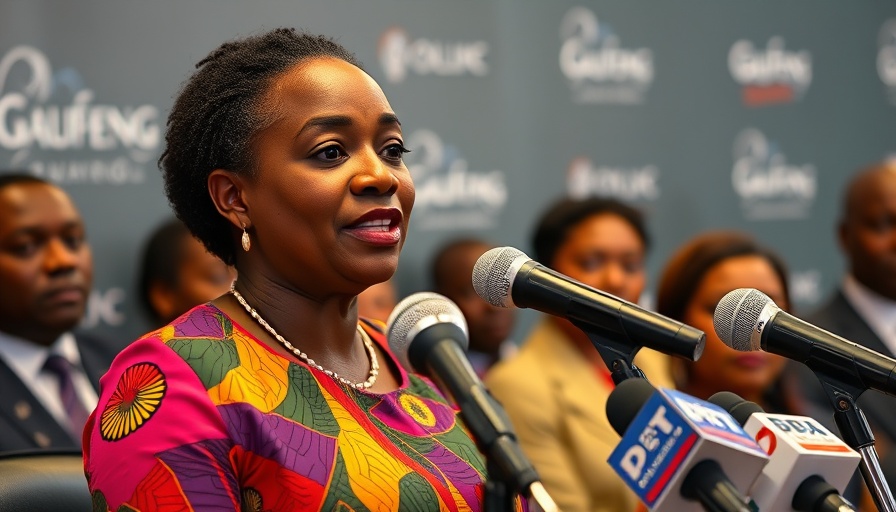
A Significant Boost to Gauteng's Healthcare System
In a transformative move to enhance healthcare services across Gauteng, the provincial government has allocated a substantial R67 billion for the 2025/26 financial year. During a post-budget briefing held on July 16, 2025, Gauteng's Health MEC Nomantu Nkomo-Ralehoko emphasized that this financial boost aims to rectify critical issues within the province’s healthcare infrastructure and service delivery.
Prioritizing Health Infrastructure and Services
The Gauteng Health Department’s budget prioritizes numerous critical areas, including improving infrastructure delivery, expanding maternal and child services, and enhancing HIV and TB outreach programs. The allocation also encompasses mental health services, an often underserved area that is gaining increasing importance in contemporary healthcare discussions. Nkomo-Ralehoko reassured the public that “this budget is very important in its impact on delivery” and reflects the government’s commitment to advancing universal healthcare within the province.
The Importance of Addressing Mental Health
With mental health issues soaring, the increase in resources to bolster mental health services, including the addition of 287 new beds at the Sterkfontein Psychiatric Hospital, stands as a crucial development. This focus highlights an ongoing recognition within South African politics of the need to address mental healthcare as part of the broader framework of health services, particularly in a post-COVID-19 environment where mental health pressures have intensified.
The Role of Infrastructure in Healthcare Delivery
One cannot underestimate the critical role that infrastructure plays in effective healthcare delivery. Investments in facilities such as the new Daveyton Hospital and the upgrades to the Johan Heyns Community Health Centre signify a dedication to meet community needs directly. Upgrading and expanding healthcare facilities ensures accessibility, which is paramount in addressing the healthcare inequities that plague the region.
Collaboration With Community Partners
The success of this initiative rests heavily on collaboration. The Gauteng Health Department is keen on engaging with numerous stakeholders including partners, community leaders, and healthcare staff. This inclusive approach not only builds trust but also ensures that the budget allocation is utilized effectively, focusing on what the community truly needs. The acknowledgment of community input is vital, especially when considering the past challenges with service delivery due to state capture and corruption in local governance.
Healthcare in the Context of Broader Political Issues
This R67 billion budget allocation does not exist in a vacuum. It must be seen against the backdrop of various national political dynamics, such as accountability measures against corruption and continuous public demands for improvement in service delivery. The ANC and its political opposition, including the Democratic Alliance (DA) and Economic Freedom Fighters (EFF), have been monitored closely regarding their commitment to healthcare reforms. The ongoing scrutiny highlights the relationship between healthcare investments and political stability within South Africa.
The Road Ahead: Future Predictions and Challenges
While the R67 billion investment is a promising step forward, challenges remain. The historical context of healthcare funding in Gauteng, coupled with issues like load shedding, economic recovery, and resource allocation following the COVID-19 pandemic, presents hurdles that need thoughtful navigation. Observations of future trends suggest that if this funding can be implemented transparently and effectively, it could restore public trust in government institutions and pave the way for significant healthcare improvements across the province.
This investment in healthcare not only signals a commitment to better service delivery but also presents an opportunity for South Africa to approach medicine and public health with a renewed lens of care, equality, and community involvement. As Gauteng engages in this ambitious initiative, it stands at a critical juncture, where a focus on accountability and collaboration could redefine healthcare accessibility and equality for generations to come.
Take Action: Engage with Your Healthcare System
As these changes roll out, it is essential for residents of Gauteng to stay informed about their healthcare services and advocate for transparency in how these funds are spent. Engaging with local health initiatives and expressing your healthcare priorities can significantly influence the outcomes of these developments. Health is community, and together, we can ensure that every rand works for the people of Gauteng.
 Add Row
Add Row  Add
Add 




Write A Comment